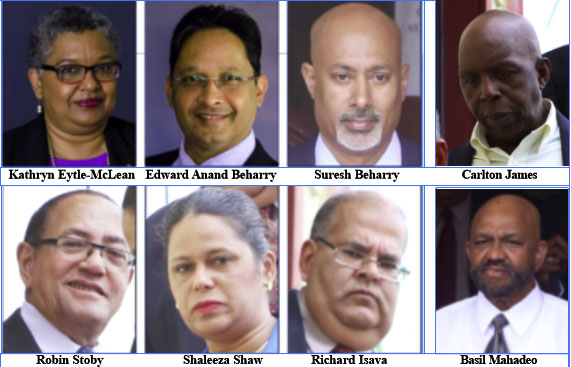Chief Magistrate Ann McLennan yesterday upheld a no-case submission on behalf of members of the Guyana Bank for Trade and Industry (GBTI) Board of Directors, who were charged by the Special Organised Crime Unit (SOCU) with failing to comply with a court order.
Robin Stoby SC, who is also Chairman of the Board, Edward Anand Beharry, Suresh Beharry, Richard Isava, Shaleeza Shaw, Carlton James, Basil Mahadeo and Kathryn Eytle-McLean are alleged to have failed to comply with an order issued by the acting Chief Justice Roxane George for the production of documents for an ongoing criminal investigation.
The charge alleged that the accused on September 7th, 2017, failed to comply with an order issued by Justice George for the production of documents for an ongoing criminal investigation.
The documents at the centre of the charge are pertinent to the ongoing US$500 million Guyana Rice Development Board (GRDB) probe being conducted by SOCU. SOCU had claimed that the bank’s failure to hand over the documents has stalled the probe.
Special prosecutor Patrice Henry led SOCU’s case during the proceedings, while the defendants were represented by a battery of attorneys, including Edward Luckhoo, Stephen Fraser, and Nigel Hughes.
On November 15th, 2018, Henry closed his case, which led to no-case submissions being made by the defence attorneys.
After further submissions by both the prosecution and defence, the Chief Magistrate yesterday ruled that the prosecutor failed to prove the essential elements of the charge.
She noted that it was the prosecutor’s duty to prove that there was a production order, that the defendants failed to comply with the said order and that the order was contravened.
She noted that she was satisfied that there was a production order with a seven-day deadline and it was later extended to November 3rd, 2018, then further extended to November 7th, 2018. An examination of the evidence, she noted, shows that the defendants were charged in October. This, she said, had led the court to the conclusion that at the time of the laying of the order the time had been varied and was not yet expired. As a result, she said there could be no breach of a production order since the date was not yet met.
Additionally, it was stated that for non-compliance to be ascertained, the prosecutor should have presented all documents to the court that were received from GBTI. The prosecution’s evidence was of some documents that were tendered and some that were not tendered into evidence. If the court cannot ascertain what was produced, the magistrate said, it then cannot state what was not produced by GBTI. It was further noted that there was no reason presented to the court as to why all the documents were not tendered.
Considering the entire case presented by the prosecution, the Chief Magistrate concluded that the prosecution failed to prove that at the time of the charge the time listed in the order had expired and that there was a failure to produce the documents.
Upon these grounds the no-case submissions made on behalf of the defendants were upheld and the charge against them was dismissed.






